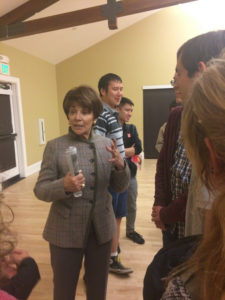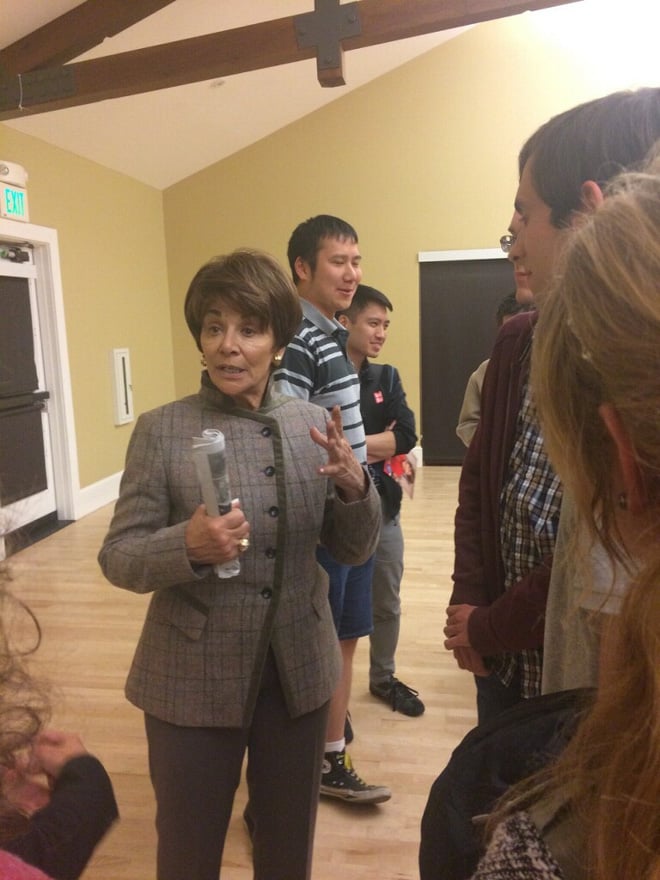Stanford in Government (SIG), in partnership with Stanford Women in Politics, Stanford Democrats and Stanford Women’s Coalition organized a dinner last week with Congresswoman Anna Eshoo (D-Atherton) and Carl Guardino, CEO and president of the Silicon Valley Leadership Group (SVLG). Eshoo and Guardino addressed students on topics ranging from their careers, infrastructure issues in Santa Clara County, immigration and cybersecurity.
Eshoo has been a U.S. Representative for California’s 18th district – which includes Stanford – since 1993. She is currently a ranking member of the Subcommittee on Communications and Technology.

Carl Guardino’s work as the CEO of SVLG involves influencing public policy in the Valley. SVLG has been an active advocate for immigration reform.
“A dream is a goal with a plan,” Guardino said. “You have to work hard if you want to earn something. Both speakers agreed that Silicon Valley is a place where hard work is rewarded and is integral to community building. Guardino and the congresswoman first spoke on the details of Measure B, a ballot proposal that calls for a 30-year, half-cent sales tax to improve infrastructure in the area.”
Guardino outlined a six-part plan to improve local infrastructure. This includes extending BART by 10 miles, electrifying the Caltrain, linking BART to the Caltrain, reducing car usage, developing auxiliary lanes at 24 interchanges and spending one in five dollars on pothole repairs. Eshoo supported this plan, specifically measures related to the Caltrain, calling it the “spine of our transportation system.” She also stated that electrifying the Caltrain is going to reduce pollution by over 65 percent.
Guardino added that Measure B is a vote on a specific tax, which requires a two-thirds majority. This specific tax will “lock in funds” for these proposed development projects.
Students were also given the opportunity to question the speakers. These questions ranged from Congress’ understanding of technology issues to the speaker’s opinions on the top issues facing the United States.
“The interest [in tech issues] has grown,” Eshoo said. “It’s grown because my Congressional District has grown as well. There isn’t a sector of our economy that isn’t affected by what we do here, which is why members from both parties come to this district on a consistent basis. As a result, we now have the House Internet Caucus with a 150 members. We in the House have established an ‘app’ challenge. We want to challenge young people to not only think about the next new thing, but to attract them into the areas of science, technology, math and arts. I would say the interest has grown and it’s changed for the better.”
In addition to tech reform, both speakers touched on the difficulties of immigration reform and cybersecurity as top issues facing the United States.
“Comprehensive immigration reform is [the top issue facing the U.S.] because it’s so deep, so broad and covers so many things. I think not everyone appreciates what an economic giant [immigration] is. If you set aside all the sad stories, like families being separated, this is an economic winner. Think of 14 million people actually becoming citizens, paying taxes and paying into the Social Security and Medicare trust funds, you realize what that is? It’s such a boom to our national economy,” Eshoo said.
Guardino added that comprehensive immigration reform is one of his top priorities.
“I’m a second generation immigrant. If we think for a moment that we are not a nation of immigrants, then that’s a problem,” Guardino said.
“As a country, we are very good at disrupting other systems. But, increasingly, we have had breaches. They are coming from two areas, from non-state actors and from state actors. The most vigorous state actors are the Russians. All 17 agencies of our intelligence community, they all agree 100 percent that the hacking related to our national elections is come from the Russians. So this is something very serious,” Eshoo said.
Contact Vibhav Mariwala at vibhavm ‘at’ stanford.edu.
